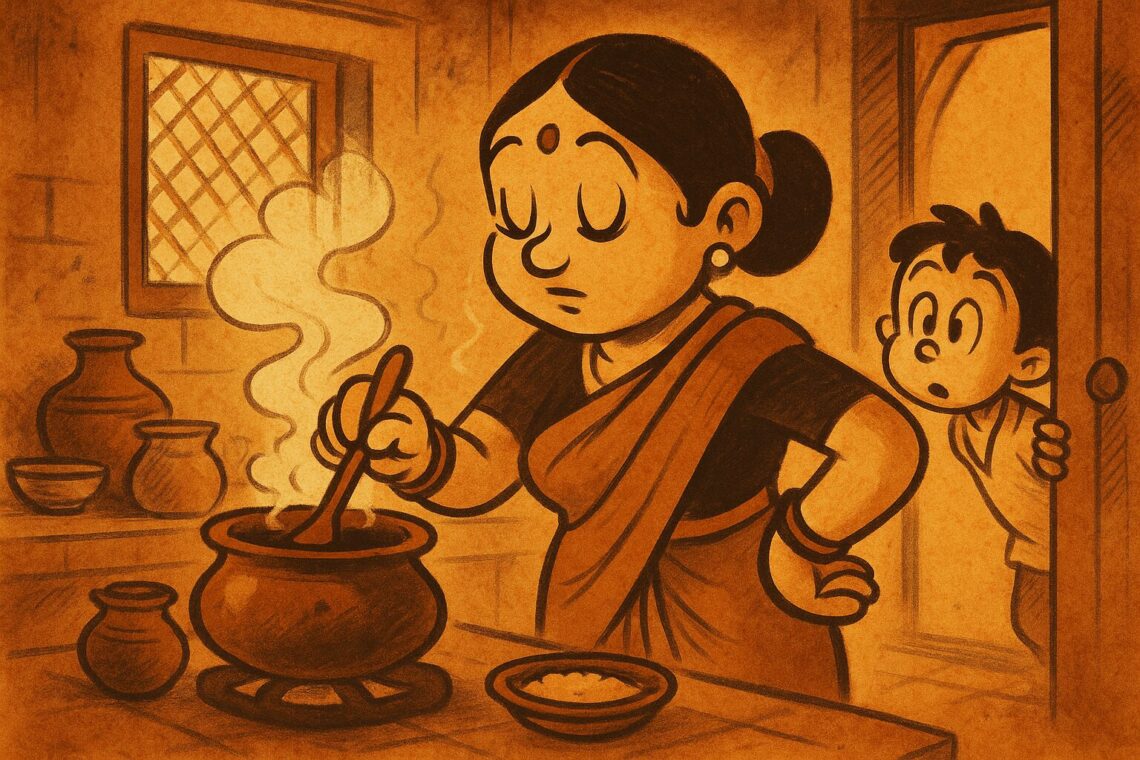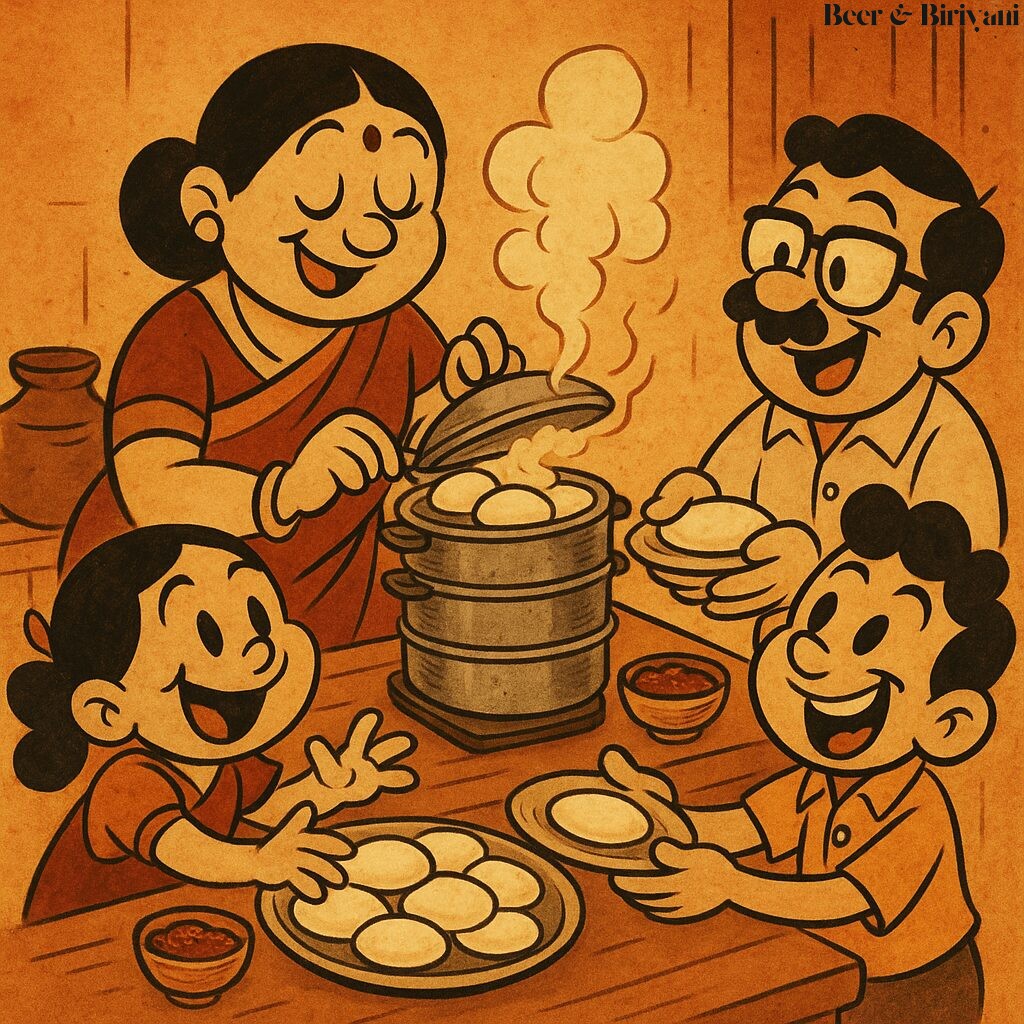In the house I grew up in—an old Mumbai apartment with creaky doors and a calendar permanently stuck on Ganesh Chaturthi—the kitchen woke before the rest of us. Not with alarms or voices, but with sound. Gentle, rhythmic, unspoken sound. The scrape of a coconut on the grater. The hiss of the first mustard seeds meeting oil. The faint thump of a wet hand shaping idli batter into its mold. It wasn’t noise. It was intention. Morning cooking was meditation dressed up as domestic duty.
Now, decades later in Austin, my mornings begin with the sharp click of a coffee machine and the glow of a phone screen. The silence still exists—but it’s different. More digital. Less devotional. And I find myself craving the tempo of those early Indian mornings—not just for the food they produced, but for the stillness they held. A stillness that tasted of care, of presence, of someone anchoring the day with turmeric and time.
The Kitchen as a Temple
In many traditional Indian households, the kitchen wasn’t just where cooking happened. It was sacred space. Often cleaned before dawn, with a fresh kolam drawn at the entrance and a tulsi plant outside greeting the sun. The first flame lit on the stove was often accompanied by a murmured chant or a gesture toward the gods. The first chapati was set aside for a cow. The second for the crow. The third for the family. That’s how seriously the morning was taken.
It wasn’t about productivity. It was about rhythm. About tuning the day’s energies through food. Before the rush of school tiffins and office bags, before doorbells and calls, there was this hour—quiet, fragrant, and slow. Rice washed in three changes of water. Dosa batter stirred with a specific wrist motion. Curry leaves plucked with intention. Not for performance. Just because it mattered.
Soundtrack of a Silent Kitchen
There’s a sound memory I hold from childhood. The dull metallic knock of the sil batta—that heavy stone slab used for grinding chutneys and spices—echoing through our tiled kitchen. My grandmother would grind green chilies and ginger with short, slow strokes, like she was composing a lullaby. You could hear how far along she was just from the texture of the sound. When it turned from scrape to smear, you knew the chutney was almost ready.
Even the pressure cooker, that iconic whistle-blower of Indian kitchens, sounded different in the morning. Less shrill. More like a sigh. And the moment just before it released steam—the pause, the anticipation—was the kitchen’s own version of pranayama.
Why We Don’t Hear It Anymore
Part of the silence is gone because of how we live now. Faster, louder, more convenience-focused. We batch-cook. We meal-prep. We microwave. And there’s no guilt in that—it’s survival. But we’ve also lost something. That sacred hush. That ritual of listening to food before eating it.
Even in India, many homes no longer begin with these slow rituals. In urban flats, the mixer-grinder has replaced the ammikkal. The stove lights instantly. Milk arrives in packets, not from a boiling pan. And the morning prayer bell has been replaced with a phone ping. It’s easier, yes. But is it better?
Morning Food Has a Different Soul
There’s a reason upma tastes different at 6 AM. Or that pongal eaten quietly, with just the sound of your spoon scraping the plate, feels more nourishing than a power bar on the go. Morning food in Indian homes was rarely flashy. It was humble. Thoughtful. It knew its job was to ground, not impress. To feed the body and also settle the spirit. It’s why so many prasadams across the country—from ven pongal to rava sheera—are morning meals. The divine, apparently, also prefers breakfast.
Trying to Reclaim It
These days, I sometimes wake up early just to make one thing slowly. Maybe it’s poha, with mustard seeds crackling in a spoon of ghee. Or adai batter poured gently on a cast-iron pan. I move quietly, not because anyone’s sleeping, but because I want to hear. The sizzling, the bubbling, the small pauses. I want to feel like I’m part of something older than my own routines.
It’s not every day. Some mornings are still toaster-bread and reheated coffee. But on the days when I do cook in silence, I feel anchored. Less scattered. More present. Like I’ve added something to the world before it began asking for things.
Listening Again
If you’re lucky enough to still live in a home where someone wakes before the alarm to cook, listen. Not just with your ears, but with memory. Those sounds—the tin box of lentils opening, the soft crackle of curry leaves, the rhythmic rolling of puris—they’re stories. They’re love. They’re anchors. And in a world that moves in beeps and buzzes, that kind of silence is worth everything.
Born in Mumbai, now stir-frying feelings in Texas. Writes about food, memory, and the messy magic in between — mostly to stay hungry, sometimes just to stay sane.












